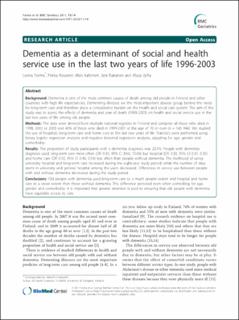| dc.contributor.author | Forma, Leena | |
| dc.contributor.author | Rissanen, Pekka | |
| dc.contributor.author | Aaltonen, Mari | |
| dc.contributor.author | Raitanen, Jani | |
| dc.contributor.author | Jylhä, Marja | |
| dc.date.accessioned | 2021-10-21T12:33:59Z | |
| dc.date.available | 2021-10-21T12:33:59Z | |
| dc.date.issued | 2011 | |
| dc.identifier.citation | Forma, Leena, Rissanen, Pekka, Aaltonen, Mari, Raitanen, Jani, & Jylhä, Marja. (2011). Dementia as a determinant of social and health service use in the last two years of life 1996-2003. BMC Geriatrics, 11 (1), 14-14. | en_US |
| dc.identifier.uri | https://hdl.handle.net/11250/2824527 | |
| dc.description.abstract | Background
Dementia is one of the most common causes of death among old people in Finland and other countries with high life expectancies. Dementing illnesses are the most important disease group behind the need for long-term care and therefore place a considerable burden on the health and social care system. The aim of this study was to assess the effects of dementia and year of death (1998-2003) on health and social service use in the last two years of life among old people.
Methods
The data were derived from multiple national registers in Finland and comprise all those who died in 1998, 2002 or 2003 and 40% of those who died in 1999-2001 at the age of 70 or over (n = 145 944). We studied the use of hospitals, long-term care and home care in the last two years of life. Statistics were performed using binary logistic regression analyses and negative binomial regression analyses, adjusting for age, gender and comorbidity.
Results
The proportion of study participants with a dementia diagnosis was 23.5%. People with dementia diagnosis used long-term care more often (OR 9.30, 95% CI 8.60, 10.06) but hospital (OR 0.33, 95% CI 0.31, 0.35) and home care (OR 0.50, 95% CI 0.46, 0.54) less often than people without dementia. The likelihood of using university hospital and long-term care increased during the eight-year study period, while the number of days spent in university and general hospital among the users decreased. Differences in service use between people with and without dementia decreased during the study period.
Conclusions
Old people with dementia used long-term care to a much greater extent and hospital and home care to a lesser extent than those without dementia. This difference persisted even when controlling for age, gender and comorbidity. It is important that greater attention is paid to ensuring that old people with dementia have equitable access to care. | en_US |
| dc.publisher | BMC Geriatrics | en_US |
| dc.rights | Navngivelse 4.0 Internasjonal | * |
| dc.rights.uri | http://creativecommons.org/licenses/by/4.0/deed.no | * |
| dc.subject | dementia | en_US |
| dc.subject | health centre | en_US |
| dc.subject | home care | en_US |
| dc.subject | service user | en_US |
| dc.subject | death register | en_US |
| dc.title | Dementia as a determinant of social and health service use in the last two years of life 1996-2003 | en_US |
| dc.type | Journal article | en_US |
| dc.source.volume | 11 | en_US |
| dc.source.journal | BMC Geriatrics | en_US |
| dc.source.issue | 1 | en_US |
| dc.identifier.doi | https://doi.org/10.1186/1471-2318-11-14 | |
| dc.source.articlenumber | 14 | en_US |

